State Pseudoscience
State Pseudoscience (also called "Neo-Lysenkoism", though often incorrectly known as "Scientism") is a form of religious thought masked as "science" and socially enforced by mainstream institutions and corporations through highly pervasive mediatic propaganda.
The core feature of State Pseudoscience is the practice of identifying "Science" with a specific set of conclusions or a specific group of people rather than a methodology/intellectual process, and consequently denouncing any form of criticism or disagreement with them as an attack against "Science" itself.
By latching onto on the psychological power of the word "Science", the promoted groups therefore assume the status of an infallible priestly chaste, the desired conclusions that of unquestionable dogmas, and the entirety of science is reduced to a mere issue of faith in authority.
In other words, state pseudoscience tacitally redefines "science" as its diametral opposite (i.e.: a religion) and, specularly, the proper application of scientific method as "anti-science".
The main difference between ordinary pseudoscience and state pseudoscience is that while the former is mainly promoted by isolated individuals, or small organizations, the latter is widely promoted and supported by mainstream media, institutions and big corporations for political and/or economic purposes; as such, state pseudoscience is several order of magnitude more dangerous than ordinary pseudoscience, since it can rely on massive amounts of economic resources, manpower and propaganda outlets that an average pseudoscientist has no way to obtain.
Features
This section exposes the main features that distinguish State Pseudoscience from actual science, and that qualify the former as a religion.
Metaphysical personalism
Science is defined as a method, not a person, nor an organization; as such, expressions like "according to Science...", "Science says that..." or "Trust the Science!" are logically nonsensical; however, the use of such expressions is a constant among State Pseudoscience promoters and believers, showing how "Science" is seen as some kind of personal, metaphysical entity akin to a god; this is furtherly suggested by the use of the capital letter ("Science" instead of just "science"), which is something usually reserved for people, not common names.
As a result, scientists and experts (or anyone posing as such) are seen as if they were literal "incarnations" or "emanations" of Science itself, in nearly the same way prophets and priests are seen as the incarnation of the divinity in some religions (the regular use of "Science" and "scientific community" as if they were interchangeable terms is a striking evidence of this fact); their members stop being seen as mere human users, they are seen as being endowed with some kind of supernatural power that renders them immune to the inherent flaws affecting normal people. It follows that being in disagreement with the scientific community is the same as being in disagreement with "Science" itself (hence the accusations of being "anti-science" and similar), and that anything they say is to be taken at face value even when it violates the most elementary laws of logic or the most direct evidence, mirroring the "Credo quia absurdum" or "God works in mysterious ways" attitude typical of the most irrationalistic forms of religious thought.
Inverted logic
Science follows a logic linear path that starts from a set of premises (definitions, axioms and evidence) and uses them to arrive at a conclusion (a scientific theory, or a judgement over a theory); in science, premises always determine the conclusion and never the other way around. State Pseudoscience instead works exactly in reverse: it starts from a pre-conceived thesis (i.e.: a conclusion) that is a-priori assumed true, and then uses it as the basis to accept and/or reject specific evidence (the premise), through a backwards application of the definitions or the scientific method; the usual workflow of State Pseudoscience goes something like this: At first, a pre-determined thesis is arbitrarily labeled as "the Science" with little supporting evidence. Then, the definition of "science" is applied in reverse to merely *assume* the existence or inexistence of evidence with no need for any actual research. The whole process can be summarized as follows: "X is the Science." -> "Science is based on evidence." -> "Therefore, evidence proves X, and there can be no evidence of the opposite." This is a glaring logical fallacy known as "Alice in Wonderland logic".
Inverted hierarchy
State Pseudoscience follows a completely inverted hierarchy of credibility. Science is based on logic and evidence; however such things are seldom readily available for everyone; for this reason it is often necessary to rely on a fallback measure in order not to grope in the dark, and that's where consensus and authority come in; consensus and authority are also important because the vastity and complexity of the world makes it impossible for a normal person to rebuild the entire edifice of science all by himself without relying on the knowledge previously accumulated by other people; for this, a certain amount of trust is inevitable; however, this trust clearly serves as nothing more than a "necessary evil" to adopt for practical purposes, and can in no way take the precedence over logic and evidence who are the very core of the scientific method. Whenever the two come into conflict, the former are always rejected in favor of the latter, and never the other way around; that's the very meaning of the word "trust": accept something as true until contrary proof.
Instead, in state pseudoscience, it works exactly in reverse: logic and evidence are subordinated to consensus/authority; they are followed only as long as they agree with the latter, and discarded the moment they don't. In other words, in state pseudoscience, "trust" is turned into *faith*: the word of the experts keeps being regarded as true even in front of contrary proof, as it happens in religious fanaticism and psychiatric illness.
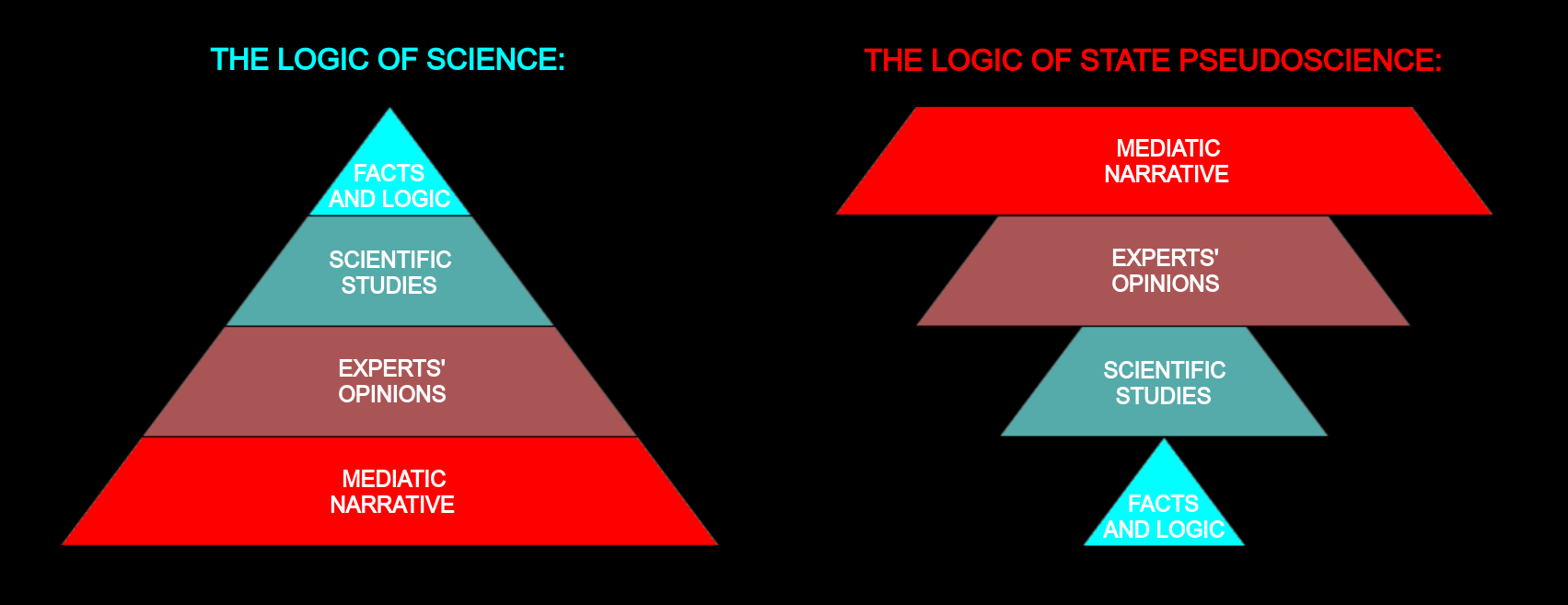
Inverted feedback
Because science is defined as a method, it follows that what makes or breaks science is not the subject at hand, and not even the proposed thesis, but the process followed to produce such thesis. Scientific statements are products of science, but they're not science themselves. This means that they're always open to eventual improvement, refinements or even refutations, and no amount of evidence in favor of a thesis can ever shield it from attempts at falsification.
Instead, in state pseudoscience, whenever the scientific method seems to lead to a certain conclusion "X", then "science" ceases being a method and becomes identified with X itself; the consequence of this is that any attempt to question X is taken as an attempt to question "science" itself, with the inevitable result that X becomes set in stone as an unquestionable dogma, violating one of the main principles of the scientific method, which is falsification.
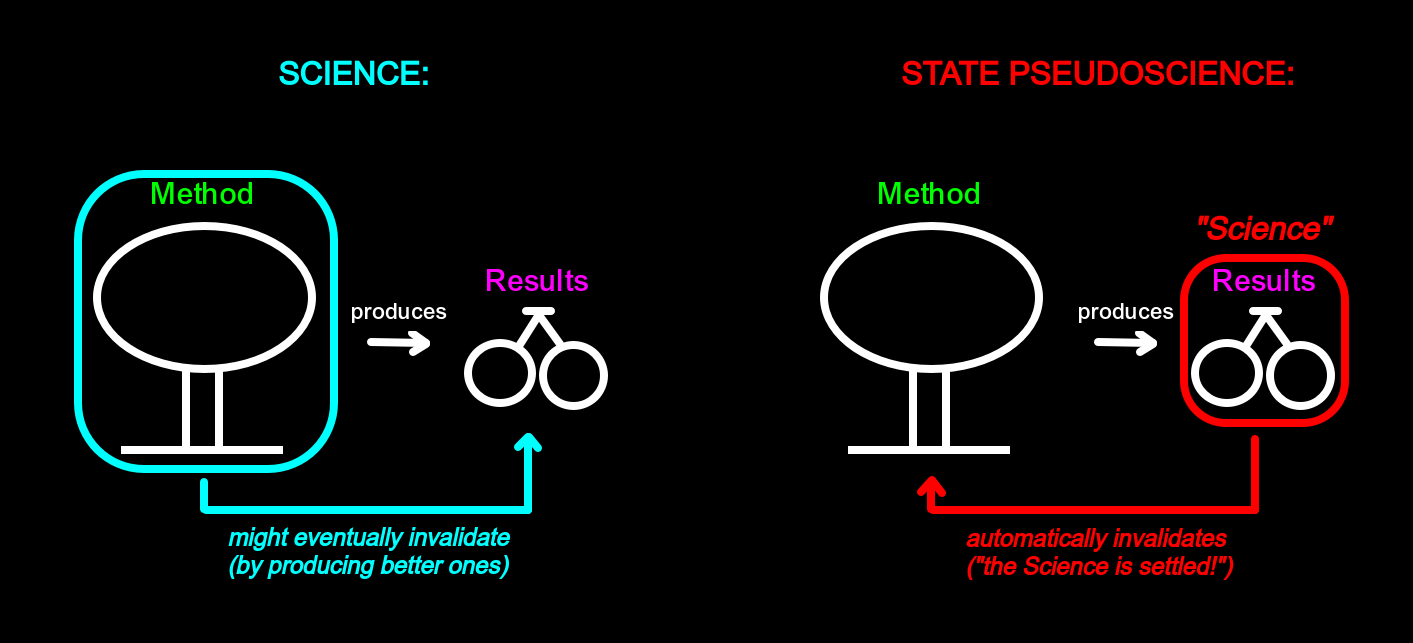
Anti-falsificationism
In science, attempts at falsification can never have a detrimental effect: if the criticism/counterevidence is sound, it gives science the opportunity to correct itself and to evolve toward a better understanding of reality; if it isn't it, then it's simply discarded and only serves to corroborate the current theory. For this reason science not only tolerates, but encourages the proliferation of as many different and conflicting ideas and observations as possible. The way science progresses is similar to the way evolution works: the higher the rate of casual mutations, the higher the speed of evolution because, even though most mutation are harmful, only the beneficials ones are conserved and passed on to the next generations; in the same way, the higher the amount of competing ideas, the higher the chances of approaching the truth, regardless of how small the rate of good ones is. However, in State Pseudoscience the prospect of "correcting itself" is exactly what is feared the most, because for State Pseudoscience the ultimate purpose is not to develop a better understanding of reality, but only to protect the official explaination (and the power that derives from it) at all costs; anything else is just a tool for that purpose. For this reason, neither insiders nor outsiders can ever be allowed to develop competing constructs, and research can only progress toward a pre-determined path, one that is concerned with what the establishment finds useful for its purposes, and not with truth or objectivity.
Dishonesty
Science rejects propaganda as a means of self-promotion; rationality is a necessary requirement of the scientific method, and the employment of psychological trickery is inherently antithetical to this requirement. Science never demands from its followers a mere "belief" in its tenets, but rather a deep understanting of the reasons behind them; therefore the main way to promote itself to the public is by giving them the intellectual tools and critical information required to achieve this understanding.
In comparison, State Pseudoscience is - by definition - entirely about propaganda and emotional manipulation; its alleged "rigor" and "evidence" rather than being displayed, are instead merely implied by a game of smoke and mirrors, involving constant lip service, imperious appeals to science, sciencey-looking aesthetics or sciencey-sounding language, simplistic slogans, periodic flaunting of its alleged successes, cult of personality around important authority figures, and more. Actually informative content is seldom presented, and when it is, it's only as a mean to an end, which is to impress the audience, and increase its own reputation.
The most significative differences between science and State Pseudoscience however lies in the the way they deals with opposing ideas; the first deals with them directly and rationally, while the latter deflects and focuses on the opponent instead.
A proper scientific debate consists in various participants interacting as equals, and refuting each other points by identifying their intrinsic errors and flaws, in light of available evidence and according to the principles of the scientific method.
In State Pseudoscience, on the contrary, most of the "debate" is entirely unilateral and consists of one side identifying and discrediting an opponent in advance through a wide range of defamatory tactics that might range from pretextuous (i.e.: true but irrelevant to the issue at hand) to outright slander (i.e.: lies); their actual points are never addressed and, when they are, they are deliberately misrepresented in order to quickly and lazily dismiss them without a proper refutation; in other words, in State Pseudoscience there is no debate, but only propaganda.
Form over substance
In its centuries-long history, scientific research had to rely on a constantly increasing dose of specific equipment, tools, language and formalism in order to progress. This baggage helped create a very distinctive image of "Science" in people's collective imaginary. Unfortunately, this image always precedes the science's real essence (the scientific method), with the result that anything tends to be perceived as "science" on the basis of whether they conform to this preconceived "sciencey" aesthetic or not rather then their adherence to the actual scientific method.
Like all forms of pseudoscience, State Pseudoscience is well aware of this psychological association and relies on it in order to promote its doctrines as "Science", but also to dismiss as "unscientific" anything that might threaten its status-quo; if something is coming out of a modern laboratory, and expressed in "sciencey"-sounding words by a guy wearing a lab-coat or a tie, then it is "Science" (regartless of whether it contains gross methodological flaws); on the contrary, anything that either comes out of some guy's basement, feature concepts with some vague similarity to some ancient/popular/religious belief or superstition, uses terms or imagery that recall magic or mysticism, then it is "unscientific" (regardless of the rigor of the theory or amount of evidence in its favor).
Discriminating between what's relevant to the correct scientific method and what's just an esterior feature however, is not always so simple and straightforward: some particular features that are commonly thought to be absolutely crucial to the scientific method might be in fact only required in a very specific way, or by the specific contexts, and trying to pass them off as inherent requirements is a clear pseudoscientific stance; pseudo-skeptics, fact-deniers and similar kind of pseudoscientists latch onto these subtleties in order to give an appearance of "rigor" to their anti-scientific activity.
Examples:
Language: a scientist will judge a theory/study on the basis of how unambiguosly the terms are defined, and how consistently they're used (i.e.: on its rigor), whereas a pseudoscientist will judge a theory on the basis of whether it uses a specific approved terminology or not (i.e.: on its vocabulary).
Mathematics: a scientist will judge a theory/study on the basis of how relevant the maths used is to the context at hand, and how correct it is, whereas a pseudoscientist will judge a theory on the basis of "how much" mathematic is used, or "how advanced" it is.
Scientific tools: a scientist will judge a theory/study on the basis of whether the instrumentation is suited to the intended task and used correctly, whereas a pseudoscientist will judge a study on the basis of "how much" or "how modern/up to date" it is.
Double standards
The rules of science are not arbitrary dogmas: they all have a rational justification; as such, they are decided beforehand, and are never changed on the basis of what's being studied. Instead, in the fake "science" promoted by mass-media, rules are nothing more than a collection of arbitrary dogmas that are chosen ad-hoc on the basis of whether they lead to a predetermined thesis, and then instantly thrown away the moment they might lead to a different one.
Examples:
- if statistics show that the cases of a given diseases are decreasing during a mass-vaccination, then that correlation is considered proof enough that the vaccination works; however, if it turns out that the cases (or the adverse effects) are rising instead, then suddenly it is remembered that "correlation does not mean causation", and the evidence is dismissed as mere "coincidence";
- if an expert agrees with the establishment, then he is to be trusted without questioning because he's the expert, and no internet blog is allowed to criticize him; however, if the expert is the one who disagrees with the establishment, then all his expertise doesn't count anymore, and even an internet blog is reputed to be credible enough to criticize him;
- if a scientist who disagrees with the establishment is found out to have conflicts of interests, shady connections, or some other skeleton in the closet, that means said scientist is not credible, and everything he ever said is to be forgotten; however, if the same things are found out regarding a scientist who agrees with the establishment, then they're regarded as "conspirationism", and they're the ones to be forgotten instead;
- as long as the official stance on a certain argument is widely accepted, then it's "settled science", and therefore it cannot be challenged nor questioned by anyone; however, when it is shown that "settled science" has been countless times shown to be wrong, than science temporarily turns into something that is constantly evolving and changing
In other words, in proper science, the rules determine the thesis; on the contrary, in state pseudoscience, the thesis determines the rules.
Blind empiricism
The purpose of science is to develop the most efficient possible description of the world, that is: to explain the highest possible amount of natural phenomena with the lowest possible amount of hypothesis. This process requires two phases: one concerned with observing, measuring and describing specific phenomena (the empirical phase), and the other (the rational one) concerned with interpreting, explaining and organizing them into a coherent synthesis, but also to critically scrutinize others' claims. Both these components are absolutely necessary in order to have proper science: a "science" without a rational component is nothing more than a collection of unrelated facts that's in no way better than a caveman's understanding of the world, while a "science" without an empirical component is fantasy or science-fiction, that is: a very elaborate representation of something that doesn't exist.
State Pseudoscience often completely disregards at least one of the two: the most usually disregarded is the rational one, and the reason is simple: while the empirical component often requires very specific means of research that only a selected group of people can have access to, the rational one only requires one's own mind and reason, which can be potentially found in everyone; therefore, using "empirical evidence" as an excuse to dismiss rationality, it is possible to shield the established truths from public critical scrutiny, allowing their promoters to come up with as much unverifiable "evidence" as they want without worrying about contradictions; this, of course, has the effect of destroying the empirical component too, reducing it to nothing more than a propaganda tool..
Politicism
One of the key features of science is the ability to revise its own conclusion in light of new evidence and research; every proven scientific statement is always assumed true until contrary proof; the failure of one specific theory is never a failure of science itself; on the contrary is a success because it allows to correct its path toward the truth and avoid falling it into the abyss of an enforced delusion.
State Pseudoscience knows this ever-changing nature is a hallmark of science, and so tries to appropriate it in order to keep its mask; the theories promoted by State Pseudoscience, in fact, did and will inevitably fail and periodically need to be replaced, and paradoxically this gives this religion and their clergy the perfect opportunity to give themselves an appearance of honesty and objectivity, and to retain their prestige untouched. But the fundamental difference lies in the reason that triggered these paradigm-shifts: in the case of science it is objectivity; in the case of State Pseudoscience it is convenience: old theories are discarded NOT when they are conclusively proven wrong, but only when keeping supporting them would not bring them any further profit or power anymore, or would even become counterproductive because of a shift in the political climate or the emergence of new opportunities for profit.
Examples are:
- The post-WW2 shift from the doctrine of the so-called "scientific racism" to an equally pseudoscientific denial of racial differences.
- The shift from the classification of homosexuality and other paraphilias as "perversions"/"mental illnesses" to their acceptance as normal sexual orientations.
- The shift from the obstinate denial of the damage caused by cigarette smoke to the wide acceptance of their reality.
In all of these cases what we have is not proper scientific theories being replaced by more accurate ones after being proven wrong, but religious doctrines replaced by other ones for the sake of appeasing shifts in public perception.
Hidden Moralism
Science is entirely based on descriptive statements (as opposed to prescriptive/normative ones); it deals exclusively with how the world is, not with how it shall be, or how one should act; and since prescriptive/normative statements cannot be derived by descriptive ones, science by itself, can never give ethical advice nor make statements like "You shall do X." or "You shall not do Y."; at best, it can only make statements in the form of: "If you do X, X' will happen", "If you do Y, Y' will happen instead.". However, precisely because it does not deal with ethical issues, science can also never deny the value of ethical statements, nor deny the existence or value of ethics itself. In other words, the relationship between science and ethics is that of a "work division" of sorts where ethics determines *what* shall be done (i.e.: the ends), science determines *how* to do it (i.e.: the means). State Pseudoscience, on the other hand, has an ambivalent relationship with ethics: at times it tries to deny the very existence or value of ethics, however at the same time it also tries to enforce very strong prescriptive (therefore ethical) norms, but masks them by just calling them "scientific". In other words, State Pseudoscience attempts to act as a substitute for ethics. This is especially manifest when it comes to the issue of civil rights: opposition to determined practices are rejected on the basis of being "political" and therefore "not scientific", however, at the same time, the political promotion or enforcement of those practices is justified on the basis of being "science-based".
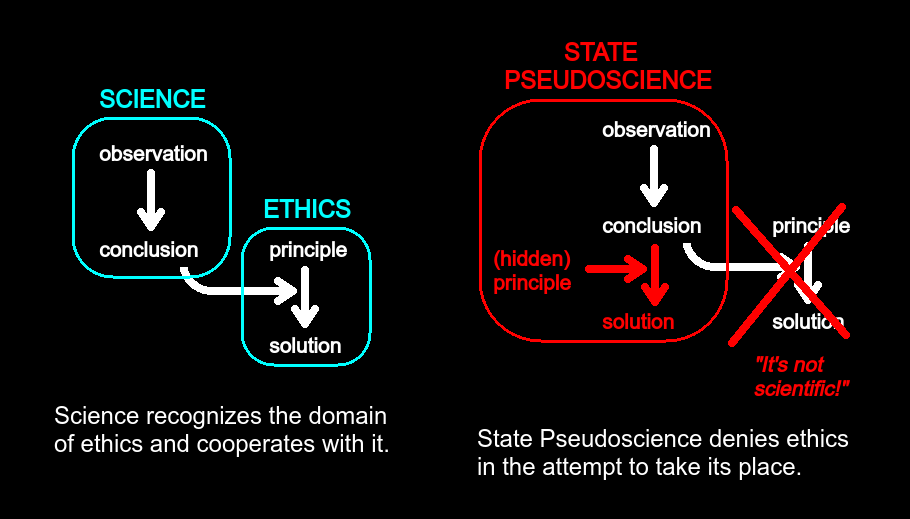
SCIENCE | STATE PSEUDOSCIENCE |
Presents itself as "something" to follow and apply | Presents itself as "someone" to believe and obey |
Recognizes scientists as mere human users | Sees scientists as living incarnation of Science |
Proceeds according to a fixed set of rules | Proceeds according to a loose set of rules who are only invoked when convenient, and disregarded when they aren't |
Follows both empirical evidence and rational thought | In theory only follows empirical evidence, in practice often disregards even that. |
When consensus/authority are contradicted by logic/evidence, the latter takes the precedence. | When consensus/authority are contradicted by logic/evidence, the former takes the precedence. |
Concerned with the intrinsic validity of theories. | Concerned with the esterior features such as terminology, titles, credentials. |
Starts from verifiable premises and uses them to arrive at a conclusion. | Starts from a pre-conceived thesis and uses them to accept observations that fit it and reject those who don't. |
Welcomes doubts and contradictory as an opportunity. | Fears doubts and contradictory as a threat to its authority. |
Deals with critics by directly addressing their key points. | Deals with critics by attacking the messanger. |
Promotes itself using explainations, demonstrations and correct information. | Promotes itself through propaganda, psychological trickery and emotional manipulation |
Always keeps its conclusions open to eventual refinements/rebuttals. | Immediately locks its conclusions as definitive and forbids further questioning. |
Changes its views when challenged by contrary evidence. | Changes its views when necessary to accomodate political/economic convenience. |
Never intermixes with politics. | Heavily influenced by politics, while also influencing them in return. |
Only deals with descriptive statements, not prescriptive ones. | Acts as a moral authority, tries to dictate both means and ends. |
Sees debates as collaborative efforts to advance together toward the truth. | Sees debates as battles with allies to defend and opponents to defeat. |
Encourages everyone to rely on their own senses and reason to discriminate true from false. | Demands the existence of an external authority with the last word on what's true and what's false. |
Levels
Generally speaking, the smarter someone is, the more effort is required to convince them; while most people can be fooled by a mere pretense of representing "Science", others might demand at least some kind of evidence; for this reason, state pseudoscience can be divided in 3 different levels in order to address the specific intellectual capabilities of its audience.
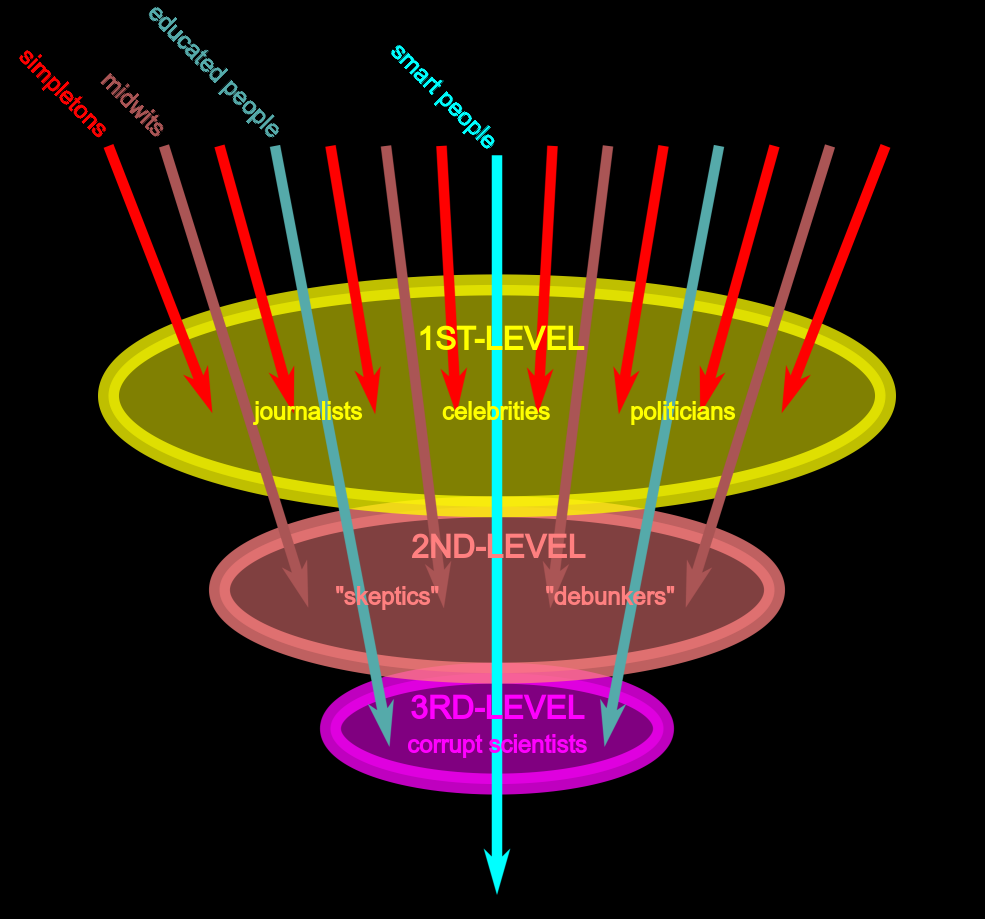
State pseudoscience acts like a series of filters designed in order to prevent people of increasing levels of intelligence from achieving true knowledge.
1st level
Managed by official institutions, big corporations and mainstream media outlets.
It relies entirely on low-level emotional manipulation and provides no proper scientific content whatsoever; at this level State Pseudoscience is even less than a pseudoscience, and more akin to a full-blown religion.
Typical examples of this level of State Pseudoscience in action are the countless appeals to "trust the Science", crusades against "misinformation" and smearing campaings against dissenters.
Only people with the lowest level of intelligence are filtered by this level.
2nd level
Managed by groups of specifically trained propagandists usually going by misleading titles such as "skeptics", "debunkers" or "fact-checkers", and internet activists/astroturfers.
It employs a more sophisticated form of propaganda involving a wide array of logical fallacies and a systematic misrepresentation of science.
Typical examples of this level are most "debunking"/"fact-checking" articles about particularly controversial issues, and most Wikipedia articles about conspiracy theories and alternative medicine or archeology.
It filters most people of low-average intelligence.
3rd level
Managed by actual scientists and researchers who have been either paid or threatened in order to go along with the official stance.
This is the only level that produces some content that could at least formally called "scientific", but the content is plagued by fake data and/or methodological flaws.
Typical examples are some studies attempting to downplay the risk/danger of vaccine side effects.
Only the most intelligent kind of people can see through this filter.
Types
State pseudoscience can be divided in 2 types depending on what their level of consensus is, and who their main actors and peddlers are:
1st-type
Is based on the fallacy of identifying science with the general consensus, where most of the scientific community agrees with the mainstream thesis, and only a very small number of scientist disagree with it; consensus can arise either because of corruption, or simple conformism and fear of losing reputation; because of the inherent difficulty of keeping a large number of scientists under control, this kind of pseudoscience affects mainly very niche subjects like advanced theoretical physics or astrophysics, and as such it can be hard to debunk unless someone has the proper competence in that specific field. Large parts of contemporary theoretical physics belongs to this cathegory.
2nd-type
Is based on the same exact fallacy but, different from the above, the fallacy is not even backed by a strong scientific consensus but only by the mere illusion of its existence; it can be qualified as "double pseudoscience", since it is paradoxically pseudoscientific even according to its own pseudoscientific definition of "science"; as such, superficial pseudoscience is very easy to debunk, since is even more detached from actual science, and qualifies as little more than popular superstition; the main actors of this kind of pseudoscience are not the scientists themselves, but the mass-media and the journalists, who are much easier to control and also much more powerful in their ability to shape public perception. A typical example of this kind of pseudoscience is the cult of vaccines.
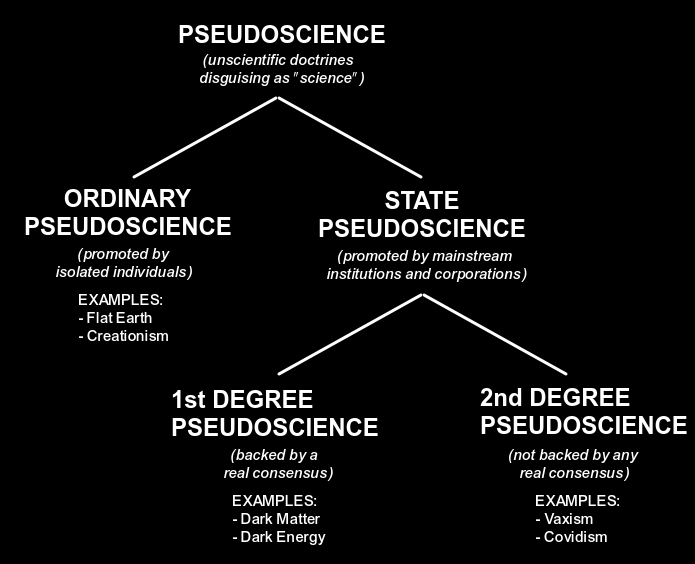
The various types of pseudoscience
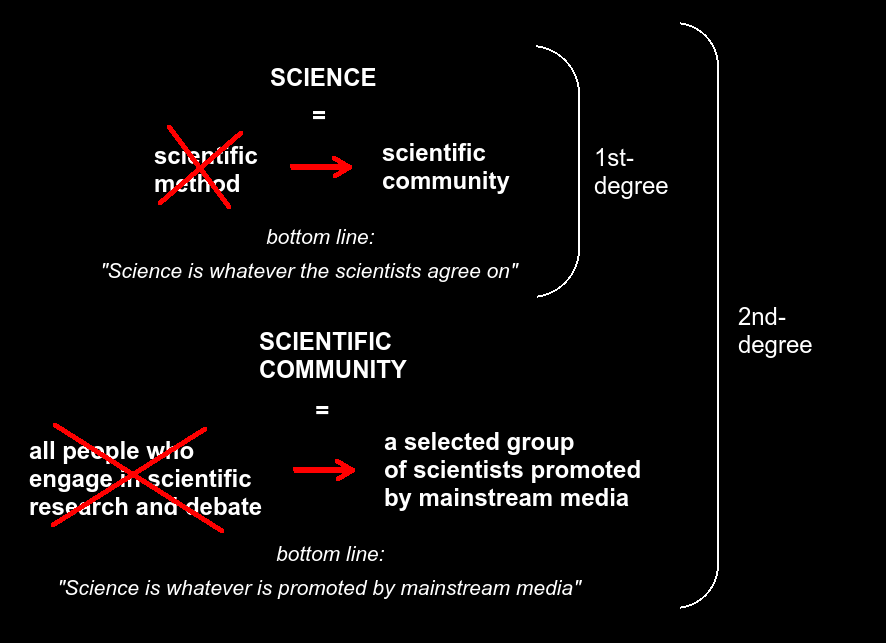
The 2 types of State Pseudoscience
Dynamic
Step 1: Redefining "science"
Tacitly change the meaning of "science", equating it with the general consensus of the scientific community rather than the correct application of the scientific method; this turns science from a rational discipline (where facts and logic are at the center) into a political/religious doctrine (where authority and consensus are at the center).
Step 2: Manufacturing consensus
Now that consensus has been enthroned in place of reason, if the consensus already agrees with what governments/corporations intends to promote, the requirements are already met; however, if such a consensus does not exist, it is necessary to create one, or even just the illusion of its existence. This can be done in various ways:
Step 2-A: Corrupting scientists
Pay scientists in order to promote your agenda instead of actual scientific evidence.
Step 2-B: Reporting only consent
Pay mass-media to selectively report only the portion of scientific community that agrees with your agenda, and completely ignore the rest.
Step 2-C: Equating silence with consent
Include into the alleged "consensus" *every* scientist who does not openly disagree with the mainstream, as if their silence automatically implied an agreement.
Step 2-D: Equating consent with research
Treat *all* favorable voices as if they were equally valid, without differentiating between those who are derived from actual scientific research, and those who are derived from mere conformity/hearsay, or obtained through corruption/threatening.
Step 3: Marginalizing dissent
Now that the intended agenda is falsely set in stone as "settled" science, any opposing view can be easily dismissed as inherently "anti-scientific" without the need for any actual rebuttal, and their promoters ridiculed and ostracized (and, in extreme cases, even persecuted by law). This discourages from voicing their dissent in fear of backlash, triggering a feedback mechanism that constantly reinforces the dominating narrative.
